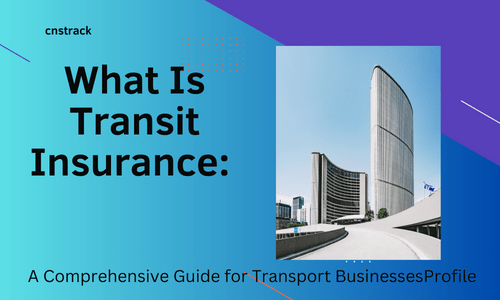What Is Transit Insurance: In the fast-paced world of the transport business, where goods are constantly on the move, ensuring the safety and security of your cargo is paramount. This is where transit insurance steps in as a critical safeguard against unforeseen risks that can threaten the integrity of your shipments. “What is transit insurance?” you might ask.
Well, in this comprehensive guide, we’ll take you on a journey through the ins and outs of transit insurance, shedding light on its importance, how it works, and why it’s an indispensable tool for any transport-focused enterprise. Whether you’re a seasoned logistics professional or just dipping your toes into the world of transportation, this article will equip you with the knowledge you need to protect your cargo and your business.
Transit insurance in the transport business, also known as cargo or shipping insurance, is a type of insurance coverage that provides protection for goods and commodities while they are in transit from one location to another. It is particularly important for businesses involved in shipping, logistics, freight, and transportation, as it helps mitigate financial losses that may occur due to various risks during transportation.
Here are key aspects of transit insurance in the transport business:
Coverage for Goods in Transit:
Transit insurance primarily covers the cargo or goods being transported. It safeguards these goods against potential risks such as theft, damage, loss, fire, accidents, natural disasters, and even deliberate acts of sabotage.
Comprehensive Protection: Transit insurance can provide comprehensive coverage options tailored to the specific needs of the cargo and the transportation mode. This may include coverage for both domestic and international shipments.
Types of Transit Insurance:
Inland Transit Insurance: This type of insurance covers goods while being transported within a single country, whether by road, rail, or inland waterways.
Marine Cargo Insurance: This insurance is designed for goods transported via sea routes. It provides protection against risks unique to ocean shipping, like piracy, shipwrecks, and rough weather conditions.
Air Cargo Insurance: For goods transported by air, this insurance covers risks associated with air travel, such as damage due to turbulence or cargo loading/unloading errors.
Multimodal or Combined Transit Insurance:
This comprehensive coverage applies to goods that move through various modes of transport during their journey, ensuring protection throughout.
Valuation Methods: Transit insurance policies may offer different valuation methods for goods. The most common options include:
Declared Value: The insured party specifies the value of the goods being transported. In case of loss or damage, the insurance payout is based on this declared value.
Invoice Value: The insurance payout is based on the invoice value of the goods, including shipping costs, taxes, and other related expenses.
Market Value: The insurance payout is determined by the market value of the goods at the time of loss or damage.
Premium Costs:
The cost of transit insurance premiums depends on several factors, including the type of goods, their value, the transportation route, the mode of transport, the packaging quality, and the level of coverage desired. Premiums can vary widely based on these variables.
Benefits of Transit Insurance:
Financial Protection: Transit insurance ensures that businesses are compensated for losses or damages to their goods during transit, minimizing financial risks.
Peace of Mind: Knowing that goods are insured during transport provides peace of mind to both shippers and consignees.
Competitive Advantage: Having transit insurance in place can be a competitive advantage for transport and logistics companies, as it instills trust in clients and partners.
Compliance: In many cases, transit insurance is required to comply with international trade regulations and contracts.
In the complex world of logistics and transportation, transit insurance plays a vital role in safeguarding the interests of businesses and ensuring the safe delivery of goods to their destinations. It is essential for companies to carefully assess their insurance needs and choose appropriate coverage to protect their assets and liabilities during the transportation process.
